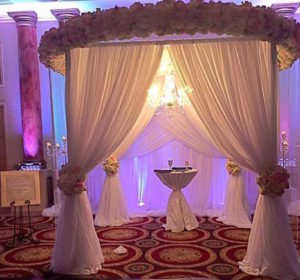 When a couple marries, is the ceremony one of Solemnization or Sanctification? This is an important distinction to understand for couples getting married and for those of us doing the officiating. When an officiant solemnizes a wedding he/she duly performs a formal marriage ceremony. When an officiant sanctifies something, that something is consecrated, set apart and declared holy, or made legitimate by a binding religious sanction. It is important to see that one can perform a legitimate ceremony (solemnize) without adding the consecration. And in point of fact, officiants are often called upon to do the one without the other.
When a couple marries, is the ceremony one of Solemnization or Sanctification? This is an important distinction to understand for couples getting married and for those of us doing the officiating. When an officiant solemnizes a wedding he/she duly performs a formal marriage ceremony. When an officiant sanctifies something, that something is consecrated, set apart and declared holy, or made legitimate by a binding religious sanction. It is important to see that one can perform a legitimate ceremony (solemnize) without adding the consecration. And in point of fact, officiants are often called upon to do the one without the other.
My role as a rabbi requires that I be committed to doing both. But that does not mean that a different officiant, a layperson, for example, cannot also incorporate the holy into the ceremony. For all of us, it requires deliberate forethought to solemnize and sanctify a wedding.
If someone asks me to perform a service that uses Jewish ritual as a perfunctory overlay, I believe that still falls under the auspices of solemnized but not sanctified (and something I am uncomfortable doing). It is only when the ritual is embraced as part of the meaning making process that we can elevate the ceremony to be one of consecration.
I have long thought about this issue as couples approach me regularly. I need the couple to make a commitment to a Jewish family and future, as well as a ceremony that resonates with the couple. Every couple I work with therefore is required to invest time and effort to understanding the rituals they will include and exclude from their ceremony in addition to having the important conversations with each other to discover what each of them understands as a Jewish family and future. I serve as the lamplighter on this journey.
A young woman shared that she was asked to officiate at her sister’s wedding. The couple said it was because the sister knew them well. The couple is in love but neither is religiously affiliated or active. Given their lack of attachment to Judaism, it is likely a ceremony that I would not do. But this anecdote points to a trend towards serious, but non-religious union. I am sure that this young woman will do her utmost to provide a meaningful ceremony. However, she will need to invest much effort in order to sanctify and solemnize her sister’s wedding (I am confident that she will, and I stand ready to help her). I wonder if the fee-for-service or mail-order ministers would do justice on behalf of the couples they ostensibly serve.
Sanctification should be an important consideration for every couple seeking a meaningful ceremony. And it needs to be an issue that every officiant honestly confronts.
